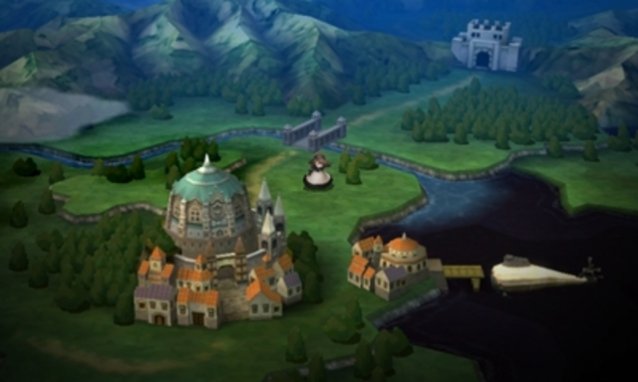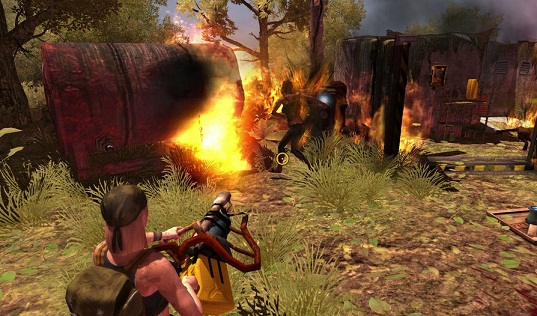


Bravely Default isn’t out yet, and I’m not one of those lucky souls with a review code. But I can tell you that it’s been awhile since an impending release has filled me with such joy.
If you’re not familiar with the title: Bravely Default is a JRPG developed by Silicon Studio and Square Enix. It’s due out in North America on February 7 for the Nintendo 3DS.
It’s the reason why – just a couple of months ago – a friend contacted me to say, “It’s time you looked at investing in a 3DS.”
And, lo and behold, I have a 3DS today.
For those of you who grew up playing the early Final Fantasy titles, Bravely Default promises to bring back conventions of the genre that have been desperately missed. We’ll be treated to random encounters, a job class system with familiar roles like Black Mage and Knight, turn-based battle, countless types of weapons and armor, and overly serious discourse.
(If you’re skeptical about that last point, here’s some evidence. In this video posted by Nintendo, one of the characters uses the word “augurs.” I want to dive right in.)
There will be Potions, Phoenix Downs, and tiered magic attacks. Everything you’d need or want from a Final Fantasy game, pretty much.
It’s like the 90s all over again.

Except, having spent a fair amount of time with the demo, I can say that I don’t think the way that I did back then.
When the demo hit the eShop earlier this month, I downloaded it as soon as I possibly could and made plans to spend a fair bit of my time with it. The anticipation I felt as the game started up – as a friendly yet anonymous voice exclaimed “Bravely Default!” – was akin to Christmas morning.
My excitement grew as the Prime Minister of Ancheim tasked the main characters (Agnès, Ringabel, Edea, and Tiz) I was already prepared to love with a very loose mission. Walking the beautifully rendered and unique clockwork and windmill-laden city, conversing with the townspeople, and accepting my first quest was nostalgic, exhilarating, capable of eliciting with ease emotions that the few JRPGs I’ve picked up over the past few years have struggled to do.
I couldn’t see my face at the time, obviously, but I’m fairly certain I was smiling with the sort of intensity reserved for momentous occasions.
Fueled by sentiment and the knowledge that I had played this type of game before, I charged forth into the great stretch of desert surrounding the demo’s one city. It was like escaping Midgar to wander the world map of Gaia for the first time. And then the sound of the first random encounter hit me.
I’d like to say that first battle was a glorious one, but it wasn’t. I hadn’t stocked up on items in town, hadn’t changed a single one of my characters from the neutral Freelancer class to something more appropriate for combat, and was reckless with my use of the Brave and Default battle options introduced by the title.
And, thus, Agnès, Ringabel, Edea, and Tiz were slain by a bunch of Imps.

I was ashamed and rightly so. I’d forgotten the basics of one of my most beloved genres, forgotten the responsibility of cultivating a balanced team from scratch, forgotten the games I played as a kid weren’t always easy.
This isn’t a bad thing, though. In fact, I think it’s a selling point for Bravely Default.
The title conforms to what we expect from the genre but, despite our familiarity with the conventions it sports, the infrequency with which we see good JRPGs in North America has kept that same familiarity from becoming monotonous and uninteresting.
That’s just for those of us who haven’t been replaying the gems of our RPG library. If you’ve spent the last few months playing through Final Fantasy I through IX, that’s not a problem either.
The battle options mentioned earlier, for which the game is named, are intriguing and provide a new level of skill and understanding to effectively best your opponents (something the demo, at least, rewards you for by increasing the amount of experience points received at the end of battle).
Essentially, Default functions as a guard command. Your character forgoes his or her turn but takes less damage and stores Brave Points. Brave, on the other hand, allows you to string together a number of attacks for each character in a given turn, thereby increasing your chances of defeating a foe prior to the next turn.
However, selecting Brave uses up Brave Points and, most typically, your characters start the battle with 0. If your character goes into the negative, then he or she sacrifices that number of turns prior to being able to once again act.
A brief explanation, I know, but it demonstrates how the need for strategy is escalated in Bravely Default. Battles are no longer simply about determining an enemy’s weakness (if they have one) but are about weighing the possibility of disbanding a number of enemies in a single turn through the use of Brave and determining which job classes are most suitable for this sort of approach.
And if you’re reckless with the command and only manage to take down one foe? Well, in the demo alone, I’ve run into at least three types of enemy who can summon additional monsters to join them.
I wouldn’t suggest the Brave and Default build for all forthcoming JRPGs but, in this case, it’s a fun twist on a classic system.
And it’s not the only one.
While the full game will very likely feature some difficult battles and long stretches between save points, inns and the like, the designers have integrated a system for modifying the amount of random encounters to the player’s liking.
This feature takes the form of a percentage slider and is adjustable at any point.
Not only does this allow for the complete omission of random encounters if you so choose, but it enables you to grind out levels when needed.
This flexibility should also promote a wider range of players by enabling casual gamers (or those new to JRPGs) to more easily navigate the world and veterans to challenge themselves whenever the desire arises.
I know: it’s pretty revolutionary stuff.

Having completed the majority of the demo – which is still available if you’re interested in playing additional quests and earning item sets that will carry over to the main game – I’m more than ready to explore everything else Bravely Default has to offer.
It’s important to note between praises, however, that there’s some controversy surrounding the game. In fact, this controversy speaks to a lot of my qualms with both the gaming industry and community, and I can’t help but address it.
Around the same time the demo was released, it was announced that changes had been made to the Western version of the game. I’m often vehemently against the alteration of creative and intellectual content; however, the changes made to Bravely Default regarding the depiction of certain costumes worn by the heroines as well as the ages of, I’m assuming, all of the protagonists don’t strike me as something to combat.
I acknowledge this as censorship, and I realize that all forms of censorship (however minimal) are potentially dangerous. But I think it’s equally, if not more, dangerous to legitimize the over-sexualization of women.
 Quite frankly, as a progressive community supporting a burgeoning art form, Square Enix’s decision seems one to champion. Sex might sell a lot of things, but it cheapens what gaming is and can be to objectify any gender.
Quite frankly, as a progressive community supporting a burgeoning art form, Square Enix’s decision seems one to champion. Sex might sell a lot of things, but it cheapens what gaming is and can be to objectify any gender.
Moreover, due to the pairing of these characters’ once scanty outfits with their previous age of 15, I can’t help but think that the changes were necessary in a social climate that is so prone to proselytizing the dangers of videogames.
No matter what you think of this issue of censorship, much of the game and the details surrounding its release speak to Square Enix’s dedication to marry the old with the new, breathing life into a sometimes floundering genre.
Whether you’re a long-time fan of JRPGs or completely unfamiliar with them, I’d recommend pre-ordering a copy of Bravely Default and pouring the remaining hours between now and the release into its demo.
The game’s combination of charm and challenge shouldn’t disappoint.




 Super Karoshi Walkthrough
Super Karoshi Walkthrough Mad Max: Game References and Easter Eggs
Mad Max: Game References and Easter Eggs Captain Toad: Treasure Tracker Walkthrough
Captain Toad: Treasure Tracker Walkthrough The Wolf Among Us Interview: They Will Remember That
The Wolf Among Us Interview: They Will Remember That Turok Dinosaur Hunter (Remastered): System requirements
Turok Dinosaur Hunter (Remastered): System requirements